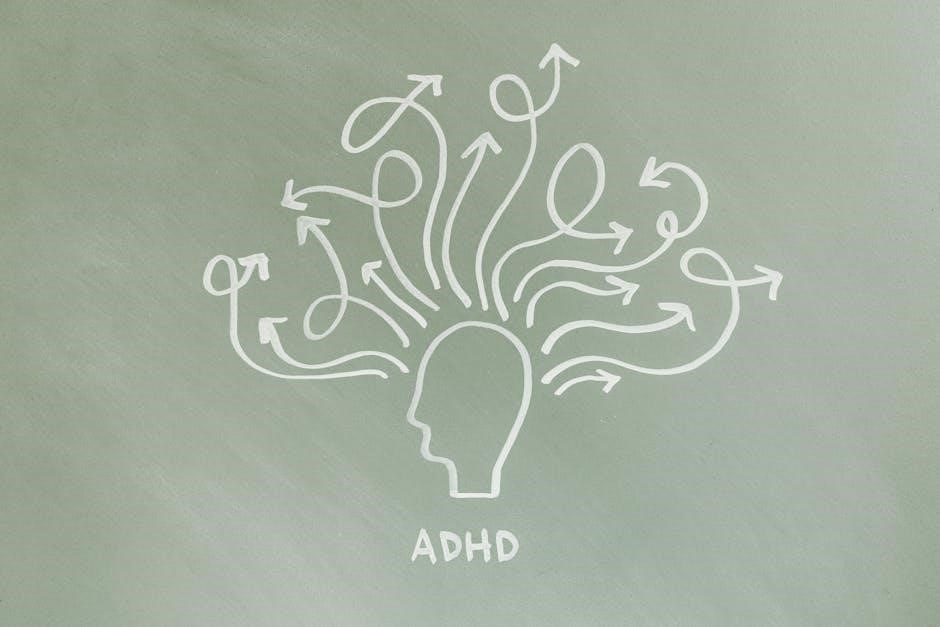Therapists require comprehensive knowledge of ADHD interventions, including behavioral, psychological, and medication-based treatments․
Overview of ADHD Interventions
ADHD interventions encompass a wide range of strategies and techniques to manage symptoms and improve daily functioning․
These interventions can be broadly categorized into behavioral, psychological, and pharmacological approaches․
The goal of these interventions is to help individuals with ADHD develop skills and strategies to manage their symptoms and improve their overall quality of life․
Effective interventions often involve a combination of these approaches, tailored to the individual’s specific needs and circumstances․
A comprehensive understanding of ADHD interventions is essential for therapists to provide effective support and guidance to their clients․
Therapists should be knowledgeable about the different types of interventions, their potential benefits and limitations, and how to implement them in a way that is tailored to the individual’s needs․
By providing a comprehensive overview of ADHD interventions, therapists can help their clients make informed decisions about their treatment and develop a personalized plan to manage their symptoms and achieve their goals․
This overview provides a foundation for understanding the various interventions available and how they can be used to support individuals with ADHD․

Behavioral Interventions for ADHD
Therapists use behavioral techniques to help individuals manage ADHD symptoms effectively daily․
Importance of Behavioral Interventions in Treating ADHD
Behavioral interventions play a crucial role in treating ADHD, as they help individuals develop skills to manage their symptoms and improve daily functioning․ These interventions can be used in conjunction with medication or as a standalone treatment․ Therapists work with patients to identify areas of difficulty and develop strategies to overcome them․ Behavioral techniques such as positive reinforcement, token economies, and cognitive-behavioral therapy can be effective in reducing ADHD symptoms․ Additionally, behavioral interventions can help individuals with ADHD develop better organizational and time management skills, leading to improved academic and occupational performance․ By addressing the underlying behavioral issues, therapists can help patients with ADHD lead more productive and fulfilling lives․ The importance of behavioral interventions lies in their ability to provide patients with the tools and skills necessary to manage their ADHD symptoms and improve overall quality of life․ Effective implementation of these interventions requires a comprehensive treatment plan and ongoing support from therapists and other healthcare professionals․

Medication and Behavioral Interventions
Combining medication with behavioral interventions is often necessary for effective ADHD treatment and management strategies development always․
Combination of Medication and Behavioral Interventions for Effective Treatment
The combination of medication and behavioral interventions is a widely recognized approach to treating ADHD, as it addresses both the biological and environmental aspects of the disorder․ This integrated approach allows therapists to develop a comprehensive treatment plan that incorporates the use of medication to manage symptoms, while also teaching patients behavioral skills and strategies to improve their daily functioning․ By combining these two approaches, therapists can help patients achieve better outcomes and improve their overall quality of life․ The medication helps to reduce symptoms such as impulsivity and hyperactivity, while the behavioral interventions teach patients skills such as organization, time management, and self-regulation․ This combination is particularly effective in treating children with ADHD, as it helps them to develop the skills they need to succeed in school and in their personal relationships․ Effective treatment plans are developed by therapists․

ADHD Management Plan and School Initiatives
School initiatives support ADHD management plans, helping therapists implement strategies․
Role of Therapists in Creating and Implementing ADHD Management Plans
Therapists play a crucial role in creating and implementing ADHD management plans, working closely with patients, families, and educators to develop personalized strategies․ They help identify specific goals and objectives, and design interventions to achieve them․ Therapists also collaborate with other healthcare professionals to ensure comprehensive care․ By providing ongoing support and guidance, therapists empower patients and their families to manage ADHD effectively․
Therapists work with schools to implement ADHD management plans, providing training and resources to teachers and staff․ They help develop individualized education plans, and ensure that accommodations and modifications are made to support students with ADHD․ Therapists also provide counseling and therapy to help patients develop coping skills and strategies to manage their symptoms․ Overall, therapists are essential in creating and implementing ADHD management plans, and their role is critical in helping patients achieve success and improve their quality of life․ Effective ADHD management plans require a team effort, and therapists are key players in this process․

Psychotherapy and Co-Morbid Conditions in ADHD Treatment
Psychotherapy addresses co-morbid conditions, such as anxiety and depression, in ADHD treatment, using techniques like cognitive-behavioral therapy․
Interventions for Improving Medication Compliance in Adult ADHD Treatment
Improving medication compliance is crucial in adult ADHD treatment, and various interventions can be employed to achieve this goal․ Medication compliance is a significant challenge in adult ADHD treatment, and interventions such as education, counseling, and reminder systems can be used to improve adherence․ Therapists play a vital role in promoting medication compliance by working closely with patients to address concerns and monitor progress․ Additionally, interventions such as behavioral therapy and cognitive-behavioral therapy can be used to address underlying issues that may impact medication compliance․ By using a combination of these interventions, therapists can help adults with ADHD improve their medication compliance and achieve better treatment outcomes․ Effective interventions can lead to improved symptom management, enhanced quality of life, and reduced risk of co-morbid conditions․ Therapists should work collaboratively with patients to develop personalized intervention plans․
